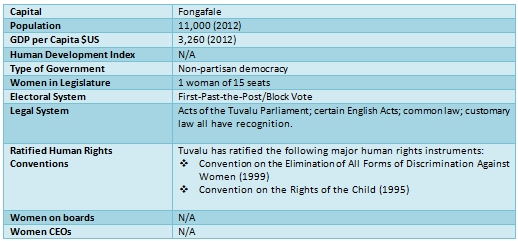Tuvalu

Formally known as the Ellis Islands, Tuvalu is located in the Pacific Ocean, south of Kiribati and north of Fiji. In 1978, Tuvalu gained its independence from Great Britain and separated itself from the Gilbert Islands, which became modern day Kiribati. Tuvalu is comprised of nine main islands, six of which are atolls, and more than 124 islets, with a total land area of only 26 sq. km[1]. The capital of Funafuti is home to more than half of the country’s population. Tuvalu is a constitutional monarchy with a parliamentary democracy, Queen Elizabeth II is its Constitutional Head.
Women and the Law
While the law provides equal opportunities for men and women, in reality women have to overcome cultural barriers in contesting elections[1].
Tuvalu does not recognise the crime of marital rape and while maximum sentences are provided by law for sexual offences, there is no provision for minimum sentences. Girls 16 years and older can be held accountable for incestuous relationships and can be found guilty of a felony.
Over a third of Tuvalu women (37%) reported having experienced physical violence during their lifetime, with 25% having experienced physical violence in the previous 12 months and 8% during pregnancy. Most of the women reporting physical violence said that a current husband or intimate partner had been violent towards them (90%), with a small number reporting violence by a sibling (8%). Close to one in five women (21%) have experienced sexual violence with 13% of women saying their first sexual intercourse was involuntary. Almost half of Tuvaluan women (47%) have experienced either physical or sexual violence, with 12% of women experiencing both forms.
Over half of women report controlling behaviour by their husband, with the most common behaviours being: insisting on knowing where she is at all times (40%); being jealous or angry if she talks to other men (29%); and not permitting her to meet female friends (16%). About 70% of women and 73% of men believe that a husband is justified in beating his wife in at least one circumstance.
Women’s Economic Empowerment
Tuvalu is predominately a subsistence economy with agriculture and fishing accounting for at least 80% of national income per capita. The Government remains the largest employer in the formal sector, as it employs over 25% of the labour force. At least 75% of the labour force works in subsistence agriculture and the informal economy. Female labour participation is estimated at 47.9% while the female rate of employment is estimated at 22.7%, with a female unemployment rate of 8.6%. The female urban[2] labour participation is estimated at 51.8%, while the urban female rate of employment is estimated at 38.4%, with female urban unemployment at 12%. The female rural employment population is 45.2%, while the female rural employment rate is 11.8% and female rural unemployment rate is 5.9%. Women work mainly in the informal subsistence economy, with at least 78% of female labour force concentration, while women form 36% of Tuvalu’s non-agricultural workforce.
Women’s Health
Tuvalu’s contraceptive prevalence rate is 31% and 24% of fertile and sexually active women indicate an unmet need for contraception. About 37% of married women make the decisions about their own healthcare (in other cases the decision is made jointly with the husband or by the husband alone). Non-communicable diseases form the primary cause of death in Tuvalu, with heart disease being the leading cause.
Women and the EnvironmentAnnual and seasonal maximum and minimum temperatures have increased in Funafuti since 1950 at a rate of 0.21°C per decade. These temperature increases are consistent with the global pattern of warming. Satellite data indicate the sea level has risen near Tuvalu by about 5mm per year since 1993 (a total of 9cm over this period). This is larger than the global average of 2.8-3.6 mm per annum. Data show that since the 18th century the level of ocean acidification has been slowly increasing in Tuvalu’s waters. Achieving environmental sustainability remains a key challenge for Tuvalu in view of current issues ranging from coastal erosion, land degradation, exploitation of terrestrial and marine biological resources, to lack of proper sanitation and climate change impacts[1].
The potential for forced displacement due to climate change needs extensive and long term community participation and debate, which must involve children and young people as well as women, men and community leaders[1].
UN Women in Tuvalu
Advancing Gender Justice in the Pacific (AGJP) Programme: UN Women is continuing its advocacy initiatives to promote women’s political participation and providing knowledge products on harmonised human rights treaty reports, including the Convention on the Elimination of all forms of Discrimination Against Women (CEDAW), as well as training for women candidates running for elections.
Ending Violence against Women (EVAW) Programme: This programme provides its stakeholders with access to virtual knowledge platforms, tools and evidence-based resources in order to better equip them with the knowledge and evidence to advocate for strengthened EVAW legislation and improved policies and services for violence against women survivors. Social media tools are also made available to support community mobilisation that aims to end violence against women and girls, through campaigns such as the United Nations Secretary General’s UNiTE to EVAW and Say NO-UNiTE.
Women’s Economic Empowerment (WEE) Programme: UN Women is supporting informed and evidence-based decision-making with regards to gender issues through the production of nationally-generated disaggregated data and statistics on the economic situation of women.
Increasing Community Resilience through Empowerment of Women to Address Climate Change and Natural Hazards (IREACH) Programme: UN Women supports the incorporation of gender dimensions in strategic documents for climate change and disaster risk management through: capacity development of stakeholders; strengthening dialogue mechanisms; and the provision of knowledge products and tools on the gendered implications of climate change and disasters.
[1] UNDAF country assessment